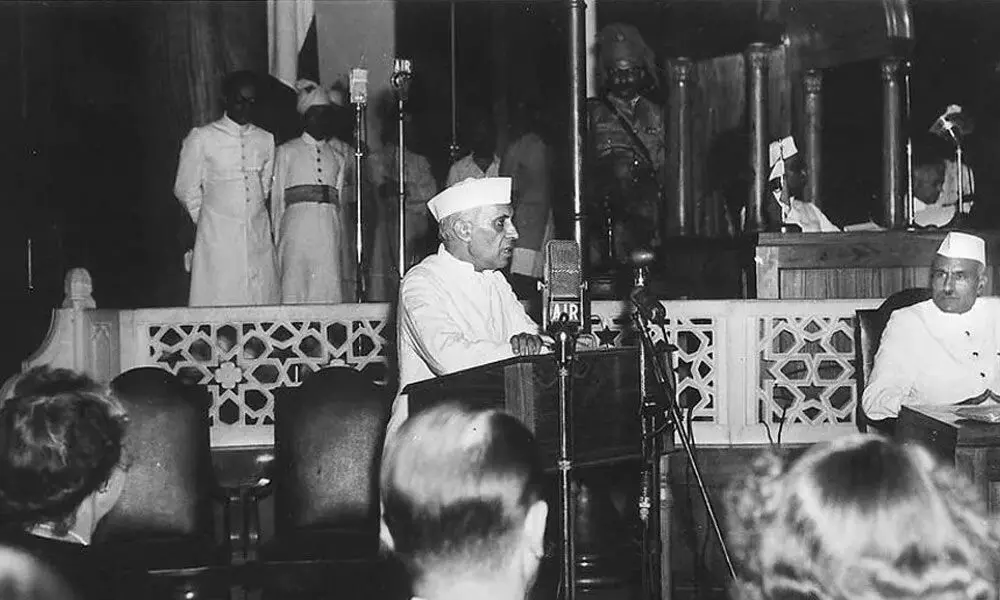75 years on, India's dreams remain just that

Jawaharlal Nehru addresses the midnight session of the Constituent Assembly of India in New Delhi on August 15, 1947.
“Tryst with Destiny" was a speech delivered by Jawaharlal Nehru, the first Prime Minister of India, to the Indian Constituent Assembly in the Parliament on the eve of India's Independence, towards midnight on 14 August 1947. It came amid an atmosphere of hope and anticipation.
"Tryst with Destiny" was a speech delivered by Jawaharlal Nehru, the first Prime Minister of India, to the Indian Constituent Assembly in the Parliament on the eve of India's Independence, towards midnight on 14 August 1947. It came amid an atmosphere of hope and anticipation.
"Long ago," Jawaharlal Nehru said, "we made a tryst with destiny, and now the time has come when we shall redeem our pledge." Despite considerable political and economic progress, 75 years into freedom, the hope had turned to cynicism.
India's dangerous decades seem to have arrived now. This crisis of governance is reflected in the erosion of its political institutions, new stresses on its federal compact, a breakdown in its national consensus, the decline of national parties, the regionalisation of the party system, a rising sense of discontent among the increasingly mobilised and politically conscious society, its continued mass poverty and mounting calls for the creation of a second republic.
Faced with this growing crisis of governance, it seems pertinent to analyse to what extent India's political system has taken root and what forces have shaped its successes and failures. However, as the phase of uncertainty still not over, one cannot comprehensively sum up the contemporary Indian history to arrive at a conclusion as to pin the blame on someone or some political party. The present conundrums are arising out of politics. If extreme thought has become the guiding principle of someone's assessment, it has become so on either side. The cause and effect diagram, if drawn, fails to point to a specific origin. Hardening of views reflects a general decline among the human beings as anyone with such a view refuses to entertain options as he is only encouraged to condemn the others. Hence, our politicians have evolved into "Me and Them" tribes to blame the opponents. A much-lowered sense and sensibility among them have also now given room to judge everyone by not only religion but also by their caste.
If we use the diplolingo, bilateral is a neutral word meaning "between two sides", whereas multilateral carries a connotation of "harmonious, cooperative." But, the unilateral? It is a connotation of "arrogant, bullying, self-centered." On that analogy, multipolar means "power-diffused," bipolar means "competition between two powers" and - here we go - unipolar, like unilateral, refers to a policy "unconcerned with the rights or feelings of others." That explains the rise of unipolar, a pole with only one end, as impossible in logic as multipolar. Because logic has no place in anyone with a unipolar view. It is always 'my way or the highway' attitude.
That particular midnight of August 14th in 1947 was one of hope. But, in a short span of time, by our Azadi's Amrit Mahotsav, we have lost that hope. It was a hope that we, all of us Indians, would live together. Today we are bartered in so many ways that our politicians question their rivals' locus standi if they go for campaign in their states. We have 'sons and daughters of soil' seeking votes but no true Indian campaigning in the elections. Secularism meant, in 1947, that the majority would protect the minority's interests. Now both are insecure in this country. Both freedoms to question and expression are lost. Is religion, region and caste becoming the raison d'etre of our existence? Any sane minds brooding over this?

